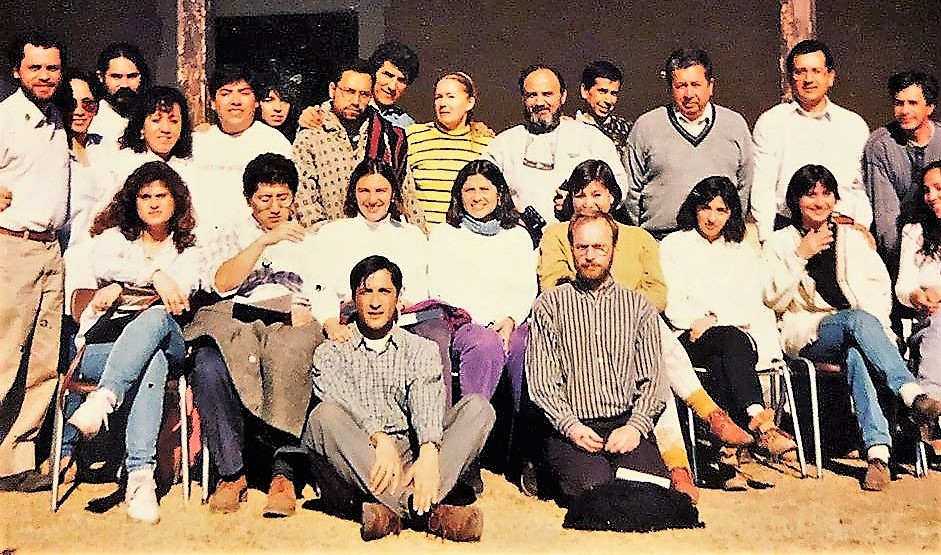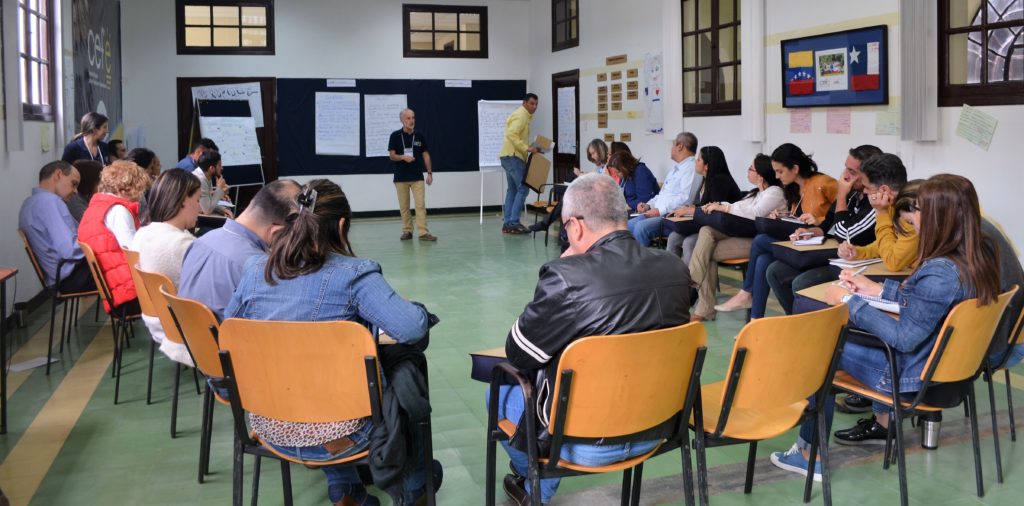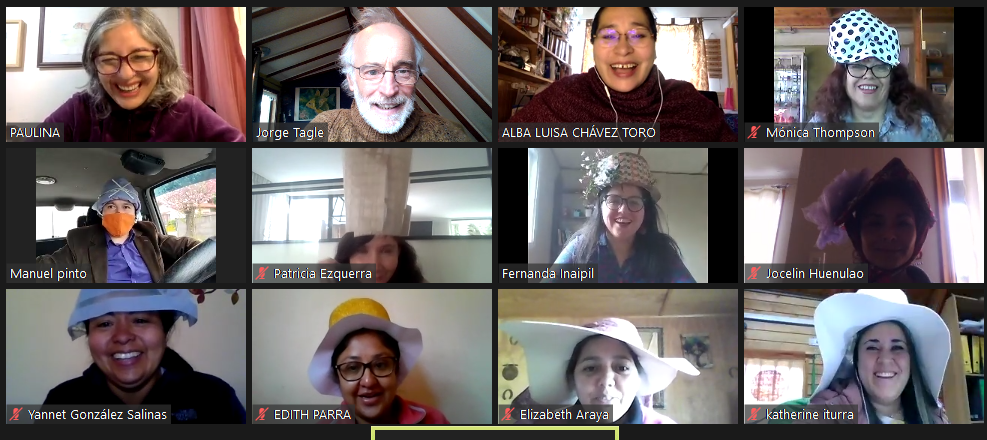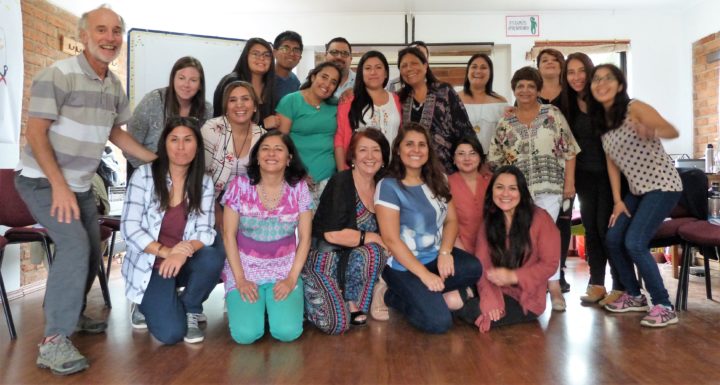The year 2022 will mark 30 years since the NGO “Trabajo para un Hermano de Concepción” started working with CEFE.
In 1992 two TPH professionals (Paulina Pacheco and Jorge Tagle) participated in the first ToT in Chile, an event supported by GTZ (now GIZ). From that fantastic training experience we adopted CEFE as our base methodology to guide the training actions that TPH Concepción carries out to this day.
We have always been captivated by CEFE, because, well applied, it is a wonderful method to facilitate training processes that have people at their center, allowing participants to express themselves in their language, include their emotions and mobilize their bodies in the classroom. Thus, since the beginning of the 1990s, we have facilitated hundreds of workshops with CEFE in programs for entrepreneurship, business management and personal development, among other objectives.
In the early 90’s we were financed by international cooperation and in the 2000’s almost exclusively by Chilean public institutions. We sell the ToTs to their participants and to institutions that choose to train their collaborators in CEFE.
We were so enthusiastic about CEFE that already in 1996 we co-organized the second ToT in Chile, this time for members of an NGO, called “Network of Solidarity Development”, of which we were part. Since then we have continued facilitating ToTs every year. Thus, today there are CEFE facilitators throughout Chile working in training programs in dozens of private and public entities. We have also facilitated ToTs in Argentina, Mexico and Venezuela.
In 1992 two TPH professionals (Paulina Pacheco and Jorge Tagle) participated in the first ToT in Chile, an event supported by GTZ (now GIZ). From that fantastic training experience we adopted CEFE as our base methodology to guide the training actions that TPH Concepción carries out to this day.
We have always been captivated by CEFE, because, well applied, it is a wonderful method to facilitate training processes that have people at their center, allowing participants to express themselves in their language, include their emotions and mobilize their bodies in the classroom. Thus, since the beginning of the 1990s, we have facilitated hundreds of workshops with CEFE in programs for entrepreneurship, business management and personal development, among other objectives.
In the early 90’s we were financed by international cooperation and in the 2000’s almost exclusively by Chilean public institutions. We sell the ToTs to their participants and to institutions that choose to train their collaborators in CEFE.
We were so enthusiastic about CEFE that already in 1996 we co-organized the second ToT in Chile, this time for members of an NGO, called “Network of Solidarity Development”, of which we were part. Since then we have continued facilitating ToTs every year. Thus, today there are CEFE facilitators throughout Chile working in training programs in dozens of private and public entities. We have also facilitated ToTs in Argentina, Mexico and Venezuela.

What explains that in Chile the CEFE methodology has been positioned and maintained for so many years, that there is a great demand for accredited facilitators and Cefistas can enjoy applying CEFE in their courses and workshops? Probably Chile together with Peru are the countries in the world where most ToTs have been carried out. We are motivated to share this story, because it can make people around the world see what CEFE could achieve in their country.
There are several factors that have contributed to maintaining the demand and prestige of CEFE in Chile. A very relevant one is that CEFE is a methodology prioritized by public institutions that finance entrepreneurship training. All post-Pinochet-dictatorship governments have maintained and developed programs to strengthen the entrepreneurial capacities of individuals and communities. In many of them, accreditation in CEFE is valued in the facilitators. It has thus has been very relevant to show CEFE to their executives, to participate in ToTs or appreciation workshops. During the 90’s the GTZ (today GIZ) collaborated in this and up to the present this prioritization of CEFE is maintained. This generates a captive demand for ToTs.
There are several factors that have contributed to maintaining the demand and prestige of CEFE in Chile. A very relevant one is that CEFE is a methodology prioritized by public institutions that finance entrepreneurship training. All post-Pinochet-dictatorship governments have maintained and developed programs to strengthen the entrepreneurial capacities of individuals and communities. In many of them, accreditation in CEFE is valued in the facilitators. It has thus has been very relevant to show CEFE to their executives, to participate in ToTs or appreciation workshops. During the 90’s the GTZ (today GIZ) collaborated in this and up to the present this prioritization of CEFE is maintained. This generates a captive demand for ToTs.

It has contributed to maintain the quality standards in the training of CEFE facilitators, in permanent relationship with CEFE International and the CEFE Latina Network. Relationships that also provide us with exchanges and continuous learning. The last of which is CEFE Digital for which we already have two accredited facilitators in TPH.
A third factor has been to complement CEFE with other facilitator training systems and methods to contribute to the development of the capacities of entrepreneurs. In our ToTs we include spaces for body work, effective communication exercises and coaching, as well as gender approaches, which allows us to provide a comprehensive training adapted to the social and cultural context.
Additionally we use CEFE for topical content such as Canvas, digital marketing, innovation, associativity and self-care. More recently we got involved in indigenous entrepreneurship adapting CEFE with elements from native cultures.
We are currently facing the challenge of implementing CEFE in a digital format for which we have had the great opportunity to become accredited as CEFE Digital Facilitators.
We already collected our first experiences in business model, associativity and digital marketing courses. We are always motivated to carry out trainings with the experiential learning cycle that demonstrates its great effectiveness, with training focused on people, respecting their needs, values and cultural identity and contributing to a comprehensive social and human development.
For this purpose, it is essential to strive for a rigorous application of CEFE, which takes care of the quality of its application and its fundamental principles.
A third factor has been to complement CEFE with other facilitator training systems and methods to contribute to the development of the capacities of entrepreneurs. In our ToTs we include spaces for body work, effective communication exercises and coaching, as well as gender approaches, which allows us to provide a comprehensive training adapted to the social and cultural context.
Additionally we use CEFE for topical content such as Canvas, digital marketing, innovation, associativity and self-care. More recently we got involved in indigenous entrepreneurship adapting CEFE with elements from native cultures.
We are currently facing the challenge of implementing CEFE in a digital format for which we have had the great opportunity to become accredited as CEFE Digital Facilitators.
We already collected our first experiences in business model, associativity and digital marketing courses. We are always motivated to carry out trainings with the experiential learning cycle that demonstrates its great effectiveness, with training focused on people, respecting their needs, values and cultural identity and contributing to a comprehensive social and human development.
For this purpose, it is essential to strive for a rigorous application of CEFE, which takes care of the quality of its application and its fundamental principles.


